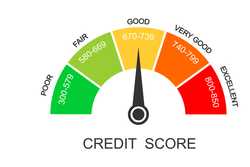The Most Common Types of Credit and How They Impact Your Credit Score

Our evaluations and opinions are not influenced by our advertising relationships, but we may earn a commission from our partners’ links. This content is created by TIME Stamped, under TIME’s direction and produced in accordance with TIME’s editorial guidelines and overseen by TIME’s editorial staff. Learn more about it.
Knowing the different types of credit can help you understand your loan options. By choosing the correct type of credit for your situation, you could potentially improve your credit score. Here’s what you need to know about the different types of credit.
Credit is borrowed money that consumers can use to fund large purchases or even everyday expenses. Credit can come in many forms including:
Each type of credit mentioned above has pros and cons along with ideal use cases. Knowing when to use which type of credit can save you time and money while helping you avoid expensive mistakes from using the wrong type of credit.
For instance, to purchase a car, one typically wouldn’t use a credit card to purchase a car because the interest rate would be very high and your credit limit may not be high enough to cover the purchase price. And most auto dealerships would rather not pay credit card fees associated with larger transactions. Additionally, car dealerships typically want you to use their preferred auto lender specializing in financing vehicles.
Another example is that of a business owner. If you are a small business owner, it’s not advisable to use a HELOC to fund the purchase of your business's inventory every quarter. Missing your HELOC payments means that you could be at risk of losing your property. An unsecured personal loan or line of credit might be a better option since you don’t have to pledge any assets for these types of loans.
These are just a few examples of different credit types and how you might use them in various situations.
Below we’ll explain how the FICO credit scoring model and individual lenders view these different types of credit.
A revolving credit account is a line of credit with a variable interest rate that allows you to borrow money up to a set limit. You make payments against the balance, and as you pay it off, the available credit resets so you can use it again.
Revolving credit accounts may be issued by financial institutions, such as banks and credit unions, but some stores may also offer them if they have an in-store credit card. Examples of revolving accounts include:
With revolving credit accounts, you’ll usually have a minimum payment due each month, however you can make payments above the minimum to pay off your balance faster. Depending on the type of account you open, you may also have access to special features like no annual fees, introductory APR promotions, or rewards programs for a revolving credit account.
Credit cards are the most common type of revolving credit account. Many credit cards, like card_name and card_name, for example, come with rewards, like cash back or points you can redeem for travel.
An installment loan has a set interest rate, repayment term, and a fixed monthly payment. It may be secured or unsecured. Installment loans can provide access to larger sums of money than, say, credit cards, and make it easier to budget for payments over the life of the loan.
Installment accounts tend to have lower interest rates than short-term financing options like credit cards or payday loans. These loans can be a more cost-effective way to borrow for those needing larger amounts of money. Some examples of installment loans include:
Home and auto loans are secured with your house and you car as collateral, which means if you don’t make your payments, the bank can take possession of those things. Personal loans, like the kind offered by Upgrade and Happy Money, do not require collateral to qualify for the loan.
See if you’re pre-qualified for a personal loan offer
Open credit is not very common and refers to a charge card. Like a revolving account credit card, there’s a credit limit. However, this account must be paid in full each month. People are most familiar with the card issuer American Express which still offers charge cards to its customers.
Your credit score is made up of:
There is no specific formula for a mix of credit types to boost your credit score. A general rule of thumb is to pay all your credit accounts on time and as agreed.
If you can add some variety to the type of credit accounts you have, lenders may perceive you as a more responsible borrower, but there’s no guarantee your score will improve. Typically, you should not seek out additional credit accounts just for the sake of improving your score. You should only open new accounts if there’s an opportunity to accomplish a financial goal. Adding variety to your credit mix would just be a plus.
Since credit mix only accounts for 10% of your credit score, focus on the two main areas that influence your credit score the most instead: amount owed and payment history. If you keep your account balances low and make payments on time, you’ll have a good chance of improving your credit score.
Secured credit accounts require something of value to collateralize or secure the loan, like home and auto loans. Unsecured loans do not require collateral and include accounts like credit cards and personal loans.
You can build credit by opening credit accounts and using them responsibly. This includes keeping your utilization ratio low (i.e. balances vs. available credit) and paying your accounts on time. If you can add a variety of credit types, like loans specifically designed for people with bad credit, it can also be helpful.
Every hard inquiry against your credit profile can result in a temporary drop in your credit score. In some cases, your inquiries can be combined if you are applying for more than one card at the same bank.
FICO is a credit scoring model that allows lenders to determine your creditworthiness. Lenders will use this score to approve or deny your credit application and set the terms for your credit once approved. It’s a three-digit number that ranges from 300 to 850.
Hard inquiries are listed on your credit reports and remain for two years but only affect your FICO score for one year. A soft credit inquiry does not impact your credit scores at all.
The information presented here is created by TIME Stamped and overseen by TIME editorial staff. To learn more, see our About Us page.



